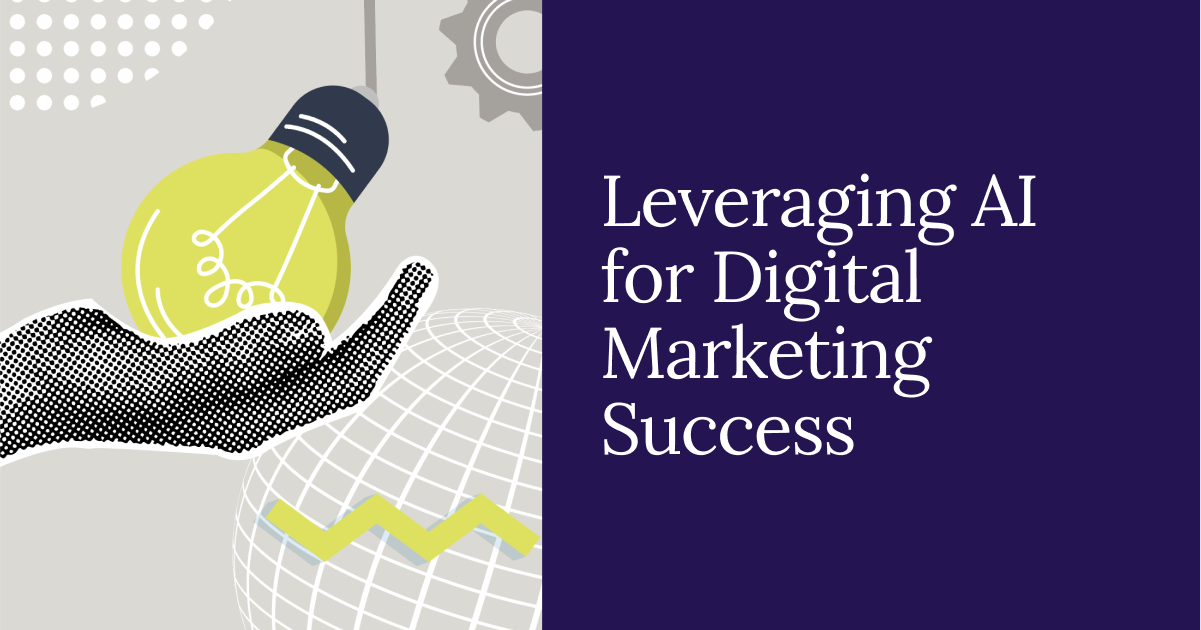
In a 2024 survey by PwC, 51 percent of CMOs responded that they plan to invest in and implement generative artificial intelligence (GenAI) technologies to enhance performance. Think about the last time you asked ChatGPT for help drafting an email, used AI-powered video editing tools on TikTok or Instagram, or browsed Netflix recommendations tailored to your viewing habits. These everyday interactions exemplify how AI is seamlessly embedded in our routines, enhancing how we communicate, consume content, and engage online.
Companies like Netflix, Spotify, and TikTok harness AI to predict preferences, shape content feeds, and engage users more deeply. For digital marketers, leveraging these same AI-driven capabilities can transform customer experiences, boost engagement, and drive growth. But with countless AI marketing tools available, it can still feel overwhelming to decide exactly which ones best align with your needs and how to effectively integrate them into your strategy.
If you’re exploring AI tools for digital marketing, our Digital Marketing Science Certificate Course offers comprehensive training to help you navigate and leverage AI effectively in your marketing strategies.
This guide will help you navigate the AI landscape, breaking down core applications across key marketing areas, offering practical insights into the latest tools, and helping you align AI solutions with your business goals.
What is AI?
Artificial intelligence (AI) refers to software systems designed to perform tasks that typically require human intelligence, like understanding language, recognizing patterns, and making decisions.
These models continuously adapt and improve through user interactions, making them increasingly effective at delivering personalized and contextually relevant content. Today, marketers can leverage these powerful AI capabilities to enhance their campaigns, automate repetitive tasks, and engage with customers more effectively.
How do large language models work?
One of today’s most widely used forms of AI is called a large language model (LLM), such as OpenAI’s ChatGPT, Google’s Gemini, or Anthropic’s Claude. LLMs are sophisticated AI systems trained on vast amounts of text from sources like the internet, books, and articles. During this training, the model learns how words and concepts relate to one another, which enables it to predict and generate relevant text outputs based on users’ prompts.
When you type a question into ChatGPT, for example, the LLM scans its learned knowledge to predict which words or phrases are most likely to answer your question or fulfill your request. Think of it like an advanced autocomplete that is able to produce coherent paragraphs, provide recommendations, answer questions, or even generate creative ideas on demand.
These models continuously adapt and improve through user interactions, making them increasingly effective at delivering personalized and contextually relevant content. Marketers can leverage these powerful AI capabilities to enhance their campaigns, automate repetitive tasks, and engage with customers more effectively.
Benefits of AI for digital marketing
AI has the potential to enhance business across all functions and departments, including digital marketing. From aiding in strategic development, improving customer experiences, and optimizing team resources, AI can transform your entire digital marketing approach.
Here are just a few of the benefits of using AI for digital marketing:
- Efficiency and automation: Digital marketers can utilize AI tools to automate repetitive and time-consuming tasks (email marketing, social media posting, and ad placement) and workflows (content approval processes, customer onboarding journeys, and campaign optimization in real-time). Automation platforms such as Zapier AI, Make.com (formerly Integromat), and HubSpot Automation streamline complex processes and workflows to increase productivity.
- Data analysis and insights: Analytics tools, including Tableau GPT, Power BI with Copilot, and Adobe Sensei, provide marketers with intuitive dashboards powered by natural language queries, allowing them to gain deeper insights without extensive analytics expertise. These tools use generative AI to offer contextually rich explanations behind data-driven recommendations.
- Personalization and customer experience: Marketers can leverage sophisticated generative AI tools like Bloomreach, Dynamic Yield, and Salesforce Einstein GPT to deliver hyper-personalized experiences across all digital touchpoints. These platforms integrate generative AI to craft real-time custom content that matches individual user behaviors and preferences.
- Predictive analytics: Digital marketers can use AI tools to forecast future trends, model scenarios, and adjust strategies in real time. Platforms like Pecan AI and H2O.ai offer marketers sophisticated, scenario-based forecasting to proactively identify opportunities before they fully materialize.
- Content creation and optimization: Digital marketers can use AI tools like GPT-4 Turbo, Claude 3, and visual tools like Runway Gen-2 and Canva’s Magic Studio to rapidly generate sophisticated multimedia content like videos, audio, images, and interactive media tailored to target audiences.
- Ad targeting and optimization: AI tools like Google’s Performance Max, Meta’s Advantage+ Campaigns, and TikTok’s Smart Performance Campaigns are reshaping how marketers target and optimize digital ads. These platforms continually adjust targeting, placements, and ad creatives to achieve the best possible outcomes within budget constraints.
- Customer service and chatbots: Conversational AI tools like Intercom’s Fin, Drift AI, and HubSpot ChatSpot provide personalized, intelligent interactions beyond standard query handling. These tools feature advanced contextual understanding and sentiment analysis to deliver more nuanced customer interactions, building stronger customer relationships at scale.
- Competitive Advantage: Digital marketers can leverage AI tools like Crayon Similarweb AI and Semrush Trends to gain visibility into competitors’ strategies. Using these advanced AI-driven insights, marketers can rapidly adapt and optimize their strategies, helping them stay ahead in increasingly competitive markets.
- Cost Reduction: Enhanced AI automation and efficiency platforms such as Monday.com AI, Asana Intelligence, and workflow-focused AI integrations within project management tools can significantly reduce operational overhead, allowing marketers to redirect budgets toward strategic initiatives and creative campaigns rather than routine tasks.
By leveraging AI marketing tools, marketers can gain deeper insights, automate processes, and enhance customer engagement, ultimately leading to improved outcomes and a stronger competitive position. It also frees up marketers’ time, allowing them to focus more on the activities that require human creativity, interaction, and oversight. Our Digital Marketing Science Certificate Course thoroughly covers these benefits, ensuring you leave with practical skills and industry-recognized certifications.
In the next section, we’ll dive deeper into AI use cases within various digital marketing subfields.
AI tools for digital marketing
AI is revolutionizing digital marketing through a variety of tools that enhance efficiency, personalization, and data analysis. Savvy digital marketers can use AI to streamline workflows, gain insights into campaign performance, and improve customer interactions. However, AI tools are not one-size-fits-all; many are designed for specialized functions within specific aspects of digital marketing.
From content marketing and SEO optimization to social media management and email marketing, AI plays a multifaceted role across digital marketing. Learners in the Digital Marketing Science Certificate Course can gain practice using AI tools for content creation, SEO, CRM, PPC, social media management, and more.
Below, we’ll highlight some specific use cases and tools that demonstrate how AI can enhance your marketing strategy. As you explore your options, keep in mind that some tools are available for free, while others may require a purchase or subscription.
AI tools for content creation
AI content creation tools are designed to help marketers produce high-quality content at scale, generating a wide range of AI-generated content ideas, outlines, and copy. Here are some broader applications of AI tools within content creation:
- Content ideation and planning: Tools like ChatGPT (GPT-4 Turbo), Claude 3, and Writesonic generate relevant and trending topic ideas, help you create detailed outlines, and optimize your content calendar for maximum engagement.
- Writing and drafting: Generative AI platforms like ChatGPT, Claude 3, and Writesonic can draft complete articles, blog posts, and personalized social media captions. Specialized email tools such as Phrasee craft engaging newsletters designed to drive clicks and conversions.
- Editing and proofreading: AI tools like Grammarly and ProWritingAid can check copy for grammatical errors and improve readability, while tools like Copyscape ensure that content remains consistent and original.
- Visual content creation: Advanced multimedia tools such as Runway Gen-2, Canva Magic Studio, Synthesia, and HeyGen allow marketers to effortlessly create engaging videos, images, and animations that enhance audience engagement and brand storytelling.
- Content localization: AI tools like DeepL and Smartling can provide high-quality translations, while platforms like Smartling can adapt content for global audiences, ensuring relevance and accuracy.
AI tools for search engine optimization (SEO)
Digital marketers can leverage AI techniques to gain deep insights into SEO performance, optimize content, and stay ahead of the competition. Here are some of the ways that AI can be used to enhance SEO:
- Keyword research and analysis: AI tools like Semrush and Ahrefs can conduct keyword research and identify high-value keywords that can drive traffic and improve search rankings.
- Content optimization: AI platforms, such as SurferSEO, MarketMuse, Clearscope, and Frase, analyze top-ranking pages and deliver precise recommendations for improving content alignment with evolving search engine algorithms.
- Technical SEO: SEO auditing tools like Screaming Frog AI, Sitebulb, and Botify use artificial intelligence to efficiently detect and address technical issues such as broken links, duplicate content, and slow loading speeds, enhancing site performance and user experience.
- SEO performance tracking: AI tools like Moz Pro, Google Analytics, and Similarweb AI provide insightful performance data, allowing SEO specialists to refine and optimize their strategies dynamically.
- Automation of routine tasks: AI tools, such as Jasper SEO integrations, can save time and reduce manual effort by automating tasks like tag generation, backlink analysis, and content updates, thereby driving stronger SEO.
AI tools for customer relationship management (CRM)
Integrating AI into CRM systems enables digital marketers to refine their customer relationship strategies, boost efficiency, and enhance customer satisfaction. AI-powered CRM tools can support optimization efforts in the following areas:
- Enhanced customer insights: AI tools, such as Salesforce Einstein, HubSpot Content Assistant, and Copper CRM, leverage AI to analyze customer interactions, providing detailed predictive insights that marketers can use to tailor personalized engagement strategies.
- Automation of routine tasks: AI tools like Zoho CRM and Pipedrive’s AI Assistant enable teams to focus on building relationships by automating repetitive tasks, such as data entry, scheduling, and follow-up emails.
- Predictive analytics: AI-driven predictive platforms like Drift Automation and HubSpot’s AI identify high-quality leads and forecast conversions, helping marketers prioritize their efforts efficiently.
- Improved customer engagement: Advanced conversational AI chatbots like Intercom’s Fin and HubSpot ChatSpot enhance customer engagement by delivering personalized, real-time support and interactions, significantly boosting customer satisfaction.
- Sales and marketing alignment: AI tools in CRM, like SugarCRM and Freshsales, facilitate alignment by providing a unified view of customer data, enabling seamless communication and strategy execution.
AI tools for advertising and pay-per-click (PPC)
By leveraging AI-powered tools, digital marketing advertisers and PPC specialists can automate processes, improve targeting, and optimize ad performance. Here’s how they are making a significant impact:
- Automated bidding: Innovative AI-powered solutions such as Google Performance Max, Meta Advantage+ Campaigns, and TikTok Smart Performance Campaigns dynamically automate bidding strategies and continually refine ad targeting for optimal results.
- Ad copy generation and optimization: Generative AI solutions like AdCreative.ai, Pattern89 (Shutterstock), and Phrasee help marketers rapidly generate compelling ad copy, automatically test variations, and optimize messaging for specific audiences.
- Precise audience targeting: Platforms like Meta Ads, Google Ads, and TikTok Ads utilize AI-driven audience insights and behavioral data to target high-converting user segments precisely.
- Performance analysis and real-time insights: PPC marketers can utilize AI tools to track and analyze campaign performance, enabling them to identify effective strategies and pinpoint areas for improvement.
- Real-time adaptation: Many AI tools for PPC include real-time adaptation features that help advertisers respond promptly to changes in user behavior and continuously optimize ad performance.
AI tools for social media management
Social media marketers can incorporate AI tools and processes into their workflow to enhance content creation, drive creativity, and generate valuable insights around audience behavior. They can accomplish this through:
- Automated content creation and scheduling: AI-driven scheduling platforms like Later AI, Buffer, Hootsuite, and Canva Social Suite automatically generate optimized posting schedules and content that maximizes audience reach and engagement.
- Sentiment analysis and audience insights: Tools such as Sprinklr AI, Brandwatch Vizia, and Talkwalker leverage AI to provide deep insights into audience sentiment, trends, and engagement, helping marketers adjust strategies accordingly.
- Social listening and monitoring: Real-time AI monitoring platforms such as Mention and HubSpot track brand mentions, competitor activities, and industry trends, enabling brands to proactively engage and manage their online reputation effectively.
- Ad optimization and targeting: Social advertising platforms like Smartly.io and Meta Advantage+ employ advanced AI to optimize ad placements, targeting, and messaging, ensuring ads reach the right audience at precisely the right moment.
- Enhanced multimedia content creation: AI-powered tools like Canva’s Magic Studio, Runway, and HeyGen empower social media marketers to effortlessly create engaging visual and video content, tailored precisely to their target audiences.
AI tools for email marketing
AI has revolutionized modern email marketing, from content enhancement to campaign optimization and better targeting. Here’s how you can benefit from artificial intelligence in your email marketing efforts:
- Automated personalization and segmentation: Platforms like Klaviyo AI, Brevo (formerly Sendinblue), and Mailchimp use AI-driven personalization to deliver individually tailored email content, significantly increasing engagement and conversion rates.
- Optimized send times and frequency: AI-powered email marketing tools, such as SendGrid and Mailmodo’s GPT-powered email generator, analyze historical data to determine the optimal send times that maximize engagement without overwhelming recipients.
- Performance analysis and insights: Tools like HubSpot and Litmus AI provide email marketers with AI-powered analytics that track key metrics and generate actionable insights to refine future campaigns.
- Spam filter avoidance: Email marketers can ensure that emails reach customer inboxes using AI tools like ClickUp, which analyzes email content and structure to improve deliverability, avoid spam filters, and reach the target audience.
- Automated A/B testing: AI-driven testing solutions such as Phrasee Optimize and SubjectLine.com AI automatically generate, test, and select the most effective variations of email content, significantly improving campaign performance and conversions.
AI tools for marketing analytics
Training AI models on diverse datasets ensures more accurate predictions and recommendations, enhancing data analysis, improving decision-making, and optimizing marketing strategies within marketing analytics. Here are some of the key ways marketing analysts can benefit from applying AI tools in their work:
- Automated data collection and integration: AI-driven data integration tools like Google Looker Studio (with AI integrations), Fivetran, and Supermetrics automate the collection, organization, and integration of data from multiple marketing channels, providing marketers with a cohesive, unified view of performance.
- Advanced data analytics and insights: Powerful AI-powered analytics platforms such as Tableau GPT, Microsoft Power BI (with Copilot), and Adobe Sensei leverage advanced machine learning algorithms to detect hidden patterns, reveal trends, and provide actionable insights beyond traditional analytics capabilities.
- Real-time analytics: Real-time AI analytics tools, including ThoughtSpot, Amplitude, and Pecan AI, deliver instant, continuous insights into marketing performance. Marketers can rapidly adapt their strategies and optimize ongoing campaigns for maximum effectiveness.
- Customer segmentation and personalization: Advanced segmentation platforms like Segment (Twilio), Blueshift, and Insider utilize AI to analyze customer behavior, demographics, and preferences, enabling marketers to craft highly personalized campaigns that drive deeper engagement and increased conversions.
- Enhanced reporting and visualization: AI-driven reporting tools such as Looker (by Google Cloud), Databox AI, and Domo AI simplify complex data, transforming it into clear, visual reports and dashboards that highlight key performance metrics, trends, and growth opportunities, enabling faster, data-driven decision-making.
AI: Use with caution
AI has seemingly limitless potential within the world of digital marketing. While it can be tempting to start testing out all the platforms you can find just to see what they can do, incorporating AI into your digital marketing strategy can pose ethical challenges and potential risks. Here’s how digital marketers can use AI tools responsibly, along with best practices to help guide your team to success.
Ethical considerations in AI use
Responsible AI adoption and use
Red flags to watch out for in digital marketing AI tools
Continue your AI learning journey
AI plays a crucial role in digital transformation, and digital marketers can benefit from learning how to leverage AI-powered tools in their work effectively. From content creation and SEO to CRM, PPC, social media management, email marketing, and analytics, AI can automate tasks, gain deeper insights, and improve customer engagement.
If you’re looking for a comprehensive education on utilizing AI in digital marketing, consider enrolling in our Digital Marketing Science Certificate Course. The 10-week program offers hands-on training to equip you with the skills and knowledge necessary to excel in this rapidly evolving field.
For more insights and resources on how to break into digital marketing (including digital marketing courses), harness the potential of AI, or advance your career in a different field, explore our blog.





